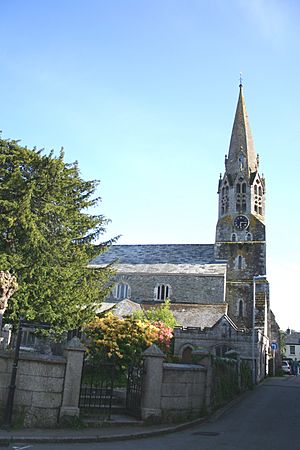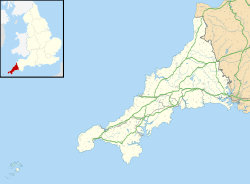St Bartholomew's Church, Lostwithiel facts for kids
Quick facts for kids St. Bartholomew's Church, Lostwithiel |
|
|---|---|

St. Bartholomew's Church, Lostwithiel
|
|
| 50°24′27″N 04°40′09″W / 50.40750°N 4.66917°W | |
| OS grid reference | SX 104 598 |
| Location | Lostwithiel, Cornwall |
| Country | England |
| Denomination | Church of England |
| Churchmanship | Broad Church |
| Website | [1] |
| History | |
| Dedication | St. Bartholomew |
| Specifications | |
| Spire height | 113 feet (34 m) |
| Administration | |
| Parish | Lostwithiel |
| Deanery | Trigg Minor and Bodmin |
| Archdeaconry | Bodmin |
| Diocese | Truro |
| Province | Canterbury |
St Bartholomew's Church is an old church in Lostwithiel, Cornwall, England. It is part of the Church of England and has a long history.
Contents
History of the Church Building
The oldest part of St Bartholomew's Church is its tower. It was built way back in the 1200s. The tall, pointed top, called a spire, was added in the early 1300s. The rest of the church building was completed later in the 1300s.
Unique Features of the Church
The spire is a special part of the church. It has an eight-sided screen around its base. Four of these sides used to have windows. The spire is made from a type of stone called Pentewan stone. It stands out as a key feature of this large town church. On the north side, you can see a carving of a St Catherine's Wheel.
Inside, the church has a clerestory above the nave. This is unusual for churches in Cornwall. A clerestory is a high section of wall with windows above the main roof. You can also find beautiful monuments from the Georgian period. There is a special brass plaque from 1423.
The large east window has five sections. It is one of the most famous windows in Cornwall. It was built around the same time as the spire. The font, which is a basin used for baptisms, is also very old, from the early 1300s. It has interesting carvings. These carvings show a huntsman with a hawk, a face with leaves growing from its mouth, and a scary face. There are also carvings of a wolf, hounds, and lions.
Church Restoration Work
The church was repaired and updated in 1878 and 1879. A local company from Lostwithiel, Messrs Phelp and Brown, did the work. An architect named Mr. Clark from London planned the changes. The outside of the church was cleaned and fixed. Inside, the old plaster ceiling was taken down. They also removed the old, uncomfortable pews.
A new roof made of pitch pine wood was put in. New floors were also installed. Special new carvings were made by Harry Hems, an artist from Exeter. All these repairs cost about £1,200 at the time. The church was reopened on May 29, 1879, with a special service.
In 1894, the church organ was made bigger. To do this, a new room was built for the clergy and choir. This room is called a vestry. It was placed in the north-west corner, under the spire. Edmund Sedding designed this new vestry. It cost about £200 to build.
The Church Organ
The church organ was first built around 1888 by Brewer of Truro. It used some pipes from an even older organ made in 1828 by Alexander Buckingham. The organ has been repaired and updated several times since then. Osmonds of Taunton worked on it, and then Lance Foy of Truro restored it in 1992. You can find more details about this organ on the National Pipe Organ Register.
Church Bells
The church tower holds a set of six bells. These bells were made by Gillett & Johnston in 1924. They are rung together to create music.
Church Connections
St Bartholomew's Church is part of a group of churches. This means it works closely with several other churches in the area. These include:
- Boconnoc Church
- St Brevita’s Church, Lanlivery
- St Cyricius and St Julietta's Church, St Veep
- St Mary the Virgin's Church, Braddock
- St Nectan’s Chapel, St Winnow
- St Winnow’s Church, St Winnow
Churchyard Features
In the churchyard, which is the area around the church, there is a grave belonging to a member of the Hext family. On this grave, there is a medieval lantern cross. This cross head was found in the 1800s, but no one knows exactly where. In 1882, it was placed in the churchyard on a new base. A local historian named Frances Margery Hext paid to have the cross fixed. It was later moved to its current spot in the churchyard.
 | Valerie Thomas |
 | Frederick McKinley Jones |
 | George Edward Alcorn Jr. |
 | Thomas Mensah |


